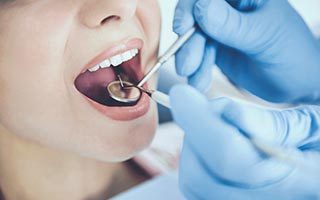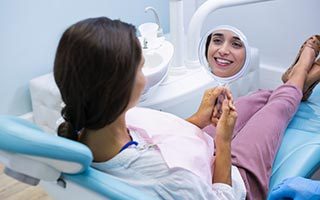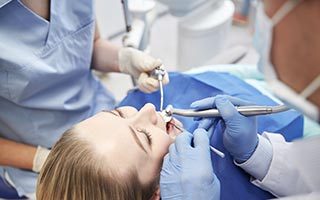TEETH GRINDING MANAGEMENT
TEETH GRINDING MANAGEMENT
Frequently Asked Questions
- What is bruxism?
- What causes bruxism?
- Does Your Child Grind His Teeth At Night? (Bruxism)
Bruxism is the term that refers to an incessant grinding and clenching of the teeth, unintentionally, and at inappropriate times. Bruxers (persons with bruxism) are often unaware that they have developed this habit, and often do not know that treatment is available until damage to the mouth and teeth have been done. Damage caused by bruxism often includes the following symptoms. However, each individual may experience symptoms differently.
Symptoms may include:
- Abraded teeth
- Facial pain
- Oversensitive teeth
- Tense facial and jaw muscles
- Headaches
- Dislocation of the jaw
- Damage to the tooth enamel, exposing the inside of the tooth (dentin)
- A popping or clicking in the TemporoMandibular Joint (TMJ)
- Tongue indentations
- Damage to the inside of the cheek
The symptoms of bruxism may resemble other conditions or medical problems. Consult a dentist or your physician for a diagnosis.
Although this habit is unintentional, oral health specialists often point to excessive stress and certain personality types as typical causes of bruxism. Bruxism often affects persons with nervous tension such as anger, pain, or frustration, and/or persons with aggressive, hurried, or overly-competitive tendencies.
Treatment for bruxism:
Treatment may involve:
- Behaviour modification
- Night Guard
- A specially-fitted plastic mouth appliance may be worn at night to absorb the force of biting. This appliance may help to prevent future damage to the teeth.
- Biofeedback involves an electronic instrument that measures the amount of muscle activity of the mouth and jaw — indicating to the patient when too much muscle activity is taking place so that the behavior can be changed. This is especially helpful for daytime bruxers.
Parents are often concerned about the nocturnal(night time) grinding of teeth (bruxism). Often, the first indication is the noise created by the child grinding on their teeth during sleep. Or, the parent may notice wear (teeth getting shorter) to the dentition. One theory as to the cause involves a psychological component. Stress due to a new environment, divorce, changes at school; etc. can influence a child to grind their teeth. Another theory relates to pressure in the inner ear at night. If there are pressure changes (like in an airplane during take-off and landing when people are chewing gum, etc. to equalise pressure) the child will grind by moving his jaw to relieve this pressure.
The majority of cases of paediatric bruxism do not require any treatment. If excessive wear of the teeth (attrition) is present, then a mouth guard (night guard) may be indicated. The negatives to a mouth guard are the possibility of choking if the appliance becomes dislodged during sleep and it may interfere with growth of the jaws. The positive is obvious by preventing wear to the primary dentition.
The good news is most children outgrow bruxism. The grinding gets less between the ages 6-9 and children tend to stop grinding between ages 9-12..

ALL SERVICES

GENERAL DENTISTRY
Check-ups, Fillings, Extractions, Children’s dental care, Mouthguards and more! Learn more



TMJ & SLEEP THERAPY
Chronic Pain of the Head and Neck, Sleep Apnea, Anti-Snoring Devices and more! Learn more
WORKING HOURS
Get in touch today!
The friendly team at Dental Seasons look forward to guiding you through all of your dentals needs!
CALL OR EMAIL US
+61 7 3269 2064
info@dentalseasons.com.au
VISIT US
119A Brighton Road
Sandgate QLD 4017
© 2024 Dental Seasons | Sitemap
